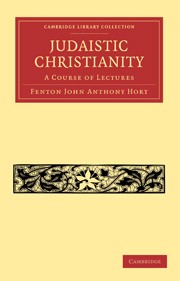Book contents
- Frontmatter
- PREFACE
- Contents
- I INTRODUCTORY LECTURE
- II CHRIST AND THE LAW
- III THE EARLY CHURCH AT JERUSALEM
- IV THE CHURCH OF ANTIOCH
- V THE INDEPENDENT ACTIVITY OF ST PAUL
- VI ST PAUL AT JERUSALEM AND THE EPISTLES OF THE ROMAN CAPTIVITY
- VII THE PASTORAL EPISTLES
- VIII JAMES, I PETER, HEBREWS, APOCALYPSE
- IX THE CHURCH OF JERUSALEM FROM TITUS TO HADRIAN
- X THE JUDAIZERS OF THE IGNATIAN EPISTLES
- XI CERINTHUS, ‘BARNABAS,’ JUSTIN MARTYR
- XII PALESTINIAN EBIONITES
- APPENDIX
- INDEX
VIII - JAMES, I PETER, HEBREWS, APOCALYPSE
Published online by Cambridge University Press: 07 September 2011
- Frontmatter
- PREFACE
- Contents
- I INTRODUCTORY LECTURE
- II CHRIST AND THE LAW
- III THE EARLY CHURCH AT JERUSALEM
- IV THE CHURCH OF ANTIOCH
- V THE INDEPENDENT ACTIVITY OF ST PAUL
- VI ST PAUL AT JERUSALEM AND THE EPISTLES OF THE ROMAN CAPTIVITY
- VII THE PASTORAL EPISTLES
- VIII JAMES, I PETER, HEBREWS, APOCALYPSE
- IX THE CHURCH OF JERUSALEM FROM TITUS TO HADRIAN
- X THE JUDAIZERS OF THE IGNATIAN EPISTLES
- XI CERINTHUS, ‘BARNABAS,’ JUSTIN MARTYR
- XII PALESTINIAN EBIONITES
- APPENDIX
- INDEX
Summary
From St Paul and the churches which he founded or to which he wrote we come back to the East. Of the remaining books of the New Testament, at least four belong to the decade preceding the Fall of Jerusalem. These four are the Epistles bearing the names of James, I Peter, Hebrews, and the Apocalypse embodying the Epistles to the seven Churches. All of them have some bearing, direct or indirect, on our subject, though in unequal degrees. They do not claim however more than a small part of our remaining time.
The Epistle of St James.
Authorship and Date
The Epistle bearing the name of James is still the subject of endless discussions. My own belief is first, that it is not the work of a late writer assuming wrongly the name of James but a true and authentic product of the apostolic age; and secondly that the James who wrote it was the James of the latter part of the Acts, he who was known as the Lord's brother, not himself of the original Twelve but specially associated with them at Jerusalem, and the head of the local Church there. The apparent immaturity, as it were, of its teaching, together with other subordinate considerations, leads many who accept its genuineness to place it very early, at least as early as any Epistle of the New Testament. They are then obliged to assume that the whole of the famous passage on faith and works in ii. 14—26 has nothing to do with St Paul, and is to be explained by language found in Jewish writers.
- Type
- Chapter
- Information
- Judaistic ChristianityA Course of Lectures, pp. 147 - 163Publisher: Cambridge University PressPrint publication year: 2009First published in: 1894



